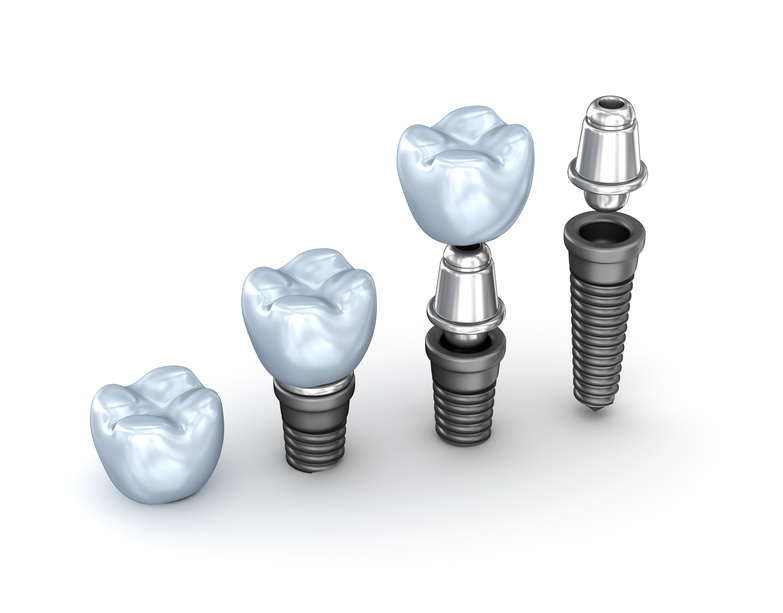Implantology – Kraków – Bronowice
Implantology is a branch of surgery involving the transplantation of implants into the jawbone in the place of missing teeth. The use of implants is becoming increasingly popular due to the following advantages of implants:
- they are the only way to prevent irreversible loss (atrophy) of bone which occurs after tooth extraction;
- they eliminate the need to irreversibly polish the neighbouring teeth, which is necessary where bridges are applied –this is particularly important where there is a need to polish completely healthy teeth with no dental prosthetic devices;
- they ensure comfort and stability of crowns and bridges, and eliminate the problem of mobile denture, ensuring a feeling of comfort and safety that no other removable prosthesis can guarantee;
- they most naturally replace the missing teeth and restore the chewing function and the liberty to speak and smile.
Implants are small high technology artificial tooth roots made of titanium, which – once placed in the bone – become its integral parts. At Dentima SCS we use two-part implants by a German company of Dentsply Friadent which is a leader on the world’s implant market, as well as the implants from other companies, for example AnyRidge by company of Megagen. They are bolt-like in shape, which provides quick stabilization. They come in various sizes and lengths, so the type of implant can be individually matched.
During implant treatment, we also make use of the undeniable advantages of regenerative dentistry, using growth factors and mesenchymal stem cells drawn from the patient’s own blood just before the operation. Thanks to this, the healing and regeneration process is faster and more reliable. Read more.
Implantology – patient qualification for treatment:
In order to qualify patients for treatment we gather detailed general and specialist stomatological information, and perform a detailed intra- and extra-oral examination. Once the indications are determined and contraindications excluded we take panoramic and periapical radiograph, and where necessary, we refer patients for computer tomography. We also refer patients for additional laboratory examinations (blood morphology, ESR, basic clotting system, alkaline and acid phosphatase levels). Then we perform stomatological preparation. It is necessary to heal all teeth and any possible inflammatory processes in gums and in parodontium before the procedure proper. Only after the future prosthetic work is planned and accepted by the patient do we start the procedure
Implantology – indications for implants:
Provided the qualification requirements are met (indications and contraindications determined, and X-ray and general examinations performed), implants are recommended where traditional methods of prosthetic treatment fail or cause too much patient discomfort (e.g. polishing healthy teeth, bad denture hygiene). Implants ensure much better conditions for replacing missing teeth and enhance solutions which would not be possible otherwise. Therefore implants can be applied in the following cases:
- single tooth loss
- multiple tooth loss
- loss of all teeth
Implantology – general contraindications:
1. Temporary
- acute infectious disease
- pregnancy
- immunosuppressive medicine used in neoplastic disease
- head and/or neck radiotherapy
- incomplete growth of the bone system
2. Absolute
- uncontrolled diabetes
- haematological disease (e.g. haemophilia)
- system disease of the bone tissue, joints, kidneys, liver, rheumatic disease
- neoplastic disease
- osteoporosis
- AIDS
3. Relative
- alcohol or drug addiction
- excessive smoking
- circulatory failure, organic heart disease
- blood clotting disorder, using anticoagulants
- mental disorders and illness
Implantology – local contraindications:
- improper oral hygiene and no motivation to keep it at a high level
- pathological changes in the soft tissue of the mouth and in the bone tissue of the upper and lower jaw
- orthopaedic disorder in the facial bones
- unhealed gums and other teeth
- parafunctions (brigmus, bruxism)
- insufficient bone tissue for introducing implants (relative contraindication)
Implantology – treatment:
Usually implants integrate with the bone within three (lower jaw) to six months (upper jaw). This is called osteointegration. Then a control X-ray is taken and a special ͞healing bolt͟ is applied –also in local anaesthesia – for approx. 3 weeks. Its task is to shape the gum around the future prosthetic crown. After another period of 2-4 weeks the final stage (i.e. a crown, bridge or prosthesis) is completed.
Implantology – success of treatment
At present 95-99% implantological procedures are successful. This is only statistics yet it should be remembered that despite such high
percentage a dental surgeon is not able to determine the potential healing capacity of the bone and soft tissues. Before applying implants doctors can only provide general prognoses regarding the process of treatment. During the healing process the patients’ general condition may additionally deteriorate for reasons not related to the treatment, which may to a considerable degree affect oral hygiene and the implant’s integration with the bone. The result of treatment is also conditional upon the patient’s active participation. Implants will remain in the bone as long as the natural teeth only if they are very well taken care of. It requires a lot of self-discipline not only to keep perfect hygiene in order to prevent mucositis, but also to strictly cooperate with the doctor and undergo regular doctor’s checks combined with full hygienization of the mouth.


